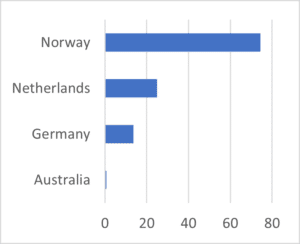Tax tweaks needed to fast-charge EV take up

Buying and running electric vehicles for business fleets is too costly under Aussie tax rules, say researchers from Griffith University and Monash University.
Their report, published today by the RACE for 2030 Cooperative Research Centre, proposes practical tax changes to support home charging and allow fleet managers to quickly adopt battery electric vehicles (BEVs).
“Some of our recommendations could be implemented right now,” says Griffith University tax law expert and lead researcher Dr Anna Mortimore.
“Because of the turnover of business fleets, these vehicles would start flowing into used car markets within three to four years, so more Australians could afford to go electric.”





